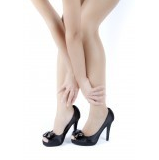What can I do if I have my feet and ankles are swollen and painful?

babyadmin |
Edema is common in pregnant women. About three-quarters of women will experience edema during their pregnancy. There is no cause for alarm, and it can be managed with some simple measures.
Signs of edema
If your ankles or feet are swollen, you have edema. You may notice that your shoes don't fit well anymore, or that your ankle bones seem to have disappeared!
Causes of edema
When you are pregnant, you have more body fluids to soften your body, so that your body can comfortably expand as the baby develops, and so that your pelvic area can open up in preparation for labour. In fact, extra fluids constitute about a quarter of your weight gain during pregnancy.
Risks of edema
Mild swelling is part and parcel of pregnancy. After all, the swelling is a symptom of the increase in body fluids necessary for your health and your baby's health. After you have given birth, you will lose a lot of body fluids in the first week, and your swelling will dissipate.
However, if you notice that your hands and your face have suddenly swelled up, this may be a sign of preelcampsia, and you should contact your doctor right away. If you notice that one leg is swelling up more than the other, and there is a localized pain in the swollen leg, it could be an indication of a blood clot, and you should also contact your doctor right away.
Steps to minimize edema
There are many easy steps you can take to minimize the swelling and the resulting discomfort.
For one, you should avoid standing or walking for long periods of time. Try to prop up your legs when you are sitting or lying down to relieve the pressure from your legs and feet. Wearing supportive stockings, also known as compression stockings, could help reduce the swelling in your ankles and feet.
If it is hot out, you should also try to keep indoors and cool, as the heat could make the swelling worse. In fact, if you are indoors, you could also use a cold compress on swollen areas to try to minimize the swelling.
If you'd like to stay active, try swimming or water aerobics. Being in a big body of water will help you get rid of some excess fluids in your body, and at the same time, the water will help float and support your body, and give you some relief from your increasing weight.
Drinking water would also help you to “flush” the body, and keep water retention at a more comfortable level. Salt should be taken sparingly, as this increases water retention in your body, which may make you feel more bloated or swollen than you already do.
